#Voyage to Loo Choo
Explore tagged Tumblr posts
Text
The Emperor is baffled by islanders of the South Pacific
Having settled where Loo Choo was, he went on to enquire about the people, making some amusing comments on their peculiarities. On telling him that they had no arms, he said, "No arms—you mean no cannon, but they have muskets?" I said not only have they no cannon, they have no swords nor spears. "Ni poignards?" asked he. "No," I replied, "We never saw any kind of warlike weapon." "Mais," said Bonaparte in a loud voice and with a manner more vehement and impatient than I had seen before, "Mais sans armes comment se bat-on?"* seemingly provoked that these simple people had no means of breaking that tranquility and peace of which, as far as we know, they are the exclusive possessors. I stated to him that they had no wars, upon which he shook his head, as if the supposition were monstrous and unnatural. When told that the people of Loo Choo had no money, he begged to question the fact. I said we had seen no money and that the people placed no value upon our gold and silver coins. He paused, and looking thoughtful, repeated to himself several times, "They do not know the use of money," and then asked how we contrived to pay for the provisions which they gave us. He was apparently much struck with the liberality of these people, who supplied us with all kinds of stock, and to so great an extent, without taking any payment. He made me describe everything we received from the natives, as well as what we had given them by way of presents.
*without arms, how do they fight?
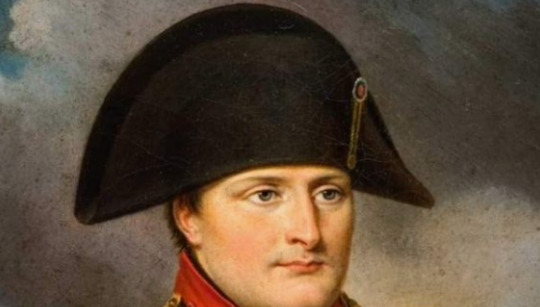
Notes of an Interview with Bonaparte at St Helena on the 13th August 1817, written by Captain Basil Hall, Royal Navy.
34 notes
·
View notes
Text


Another physical description of Napoleon to add to the collection. From August 1817.
(From: Voyage to Loo-choo … and notes of an interview with Buonaparte at St. Helena, in August 1817, by Basil Hall.)
19 notes
·
View notes
Text
English captain's description of Napoleon's appearance
Bonaparte struck me as being different in appearance from any of the representations of him which I had at the time seen.* His face was larger and more square than it is given in the pictures and busts; and the breadth of his body, particularly across the shoulders, is considerably greater than I had expected. From the accounts we had received of his corpulency we had been prepared to meet a very fat man, but although he is certainly large in the body, it would not have occurred to me to describe him as being corpulent. His flesh looked firm and he was what is termed well-set. His legs in particular were well made, and rather small. His complexion was quite pale, approaching to white. There was not the least appearance of wrinkle either on his brow or at the corners of his eyes. Were it not for an occasional lighting up of the eyes, and a sort of determined commanding glance, which pierced, as it were, into one's most hidden thoughts, I should have been disposed to describe his look as being placid or gentle, and at all times lively, but never stern. Nor was there the slightest trace of care visible in his face or in his manner; on the contrary his whole deportment, conversation and expression of countenance indicated a mind perfectly at ease. I was particularly struck with the extraordinary play of his upper lip, but it is very difficult to describe, the moreso to me as I did not see him actually under the influence of any strong emotion, and what I did observe, therefore, served not so much to show the expression itself, as to suggest to the imagination what possibly might be the powerful effect of his eye and lip in giving character to his expression when he is strongly moved. …His manners were so good that from the first moment of the interview to the last, I felt myself not only at ease in his company, but every now and then I thought I was speaking to him in too familiar a tone. I wished, of course, to show him all sorts of respect and attention, but his cheerful and encouraging manner threw me repeatedly off my guard. *Since writing the above I have seen an excellent picture of Bonaparte in the possession of Mr. Richard Power of Dublin. It was painted in 1805 by Gerard and given to the City of Rome in 1810. Mr Power bought it at Rome in 1817. This picture has much more of Bonaparte's expression of countenance than any I have seen. It represents him, of course, smaller than he is now, but the face is extremely like, and is remarkable for conveying the placidity and sweetness of expression which is at times so very striking in his countenance.
[The only painting I find Gerard painted of Napoleon in 1805 is the one below. I don't know whether or not this is the one to which Hall is referring.]

Notes of an Interview with Bonaparte at St Helena on the 13th August 1817, written by Captain Basil Hall, Royal Navy.
37 notes
·
View notes
Text
Account of English explorer meeting Napoleon on St. Helena

Notes of an Interview with Bonaparte at St Helena on the 13th August 1817, written by Captain Basil Hall, Royal Navy.
I've seen this as a published article, but here is his handwritten manuscript which is a bit different from the published one. That one is on Internet Archive.
The entire handwritten thing
#Basil Hall English explorer who met Napoleon#St. Helena#Napoleon being eccentric#Voyage to Loo Choo
18 notes
·
View notes
Text
Napoleon interrogates a visitor and is a bit eccentric

Illustration by Louis Bombled, Un capitaine anglais presente un lieutenant a Napoleon.
From the interview between Captain Basil Hall and Napoleon on St. Helena in 1817. Transcribed from Hall's handwritten copy. His father had studied at Brienne simultaneously with Napoleon, who remembered him.
"I am certain that your father must be nine or ten years older than I am—at least nine years—is it not so?" I replied that I believed he was correct, upon which he turned nearly half round on his heel, and laughing very heartily, nodded his head as if to imply that he had considerably the advantage of my father in being so many years his junior. He next asked how many children my father had; I said, "Nine alive." "Ah, c'est beaucoup," said Bonaparte with an air of affected gravity accompanied by a formal sort of bow, as if he felt desirous of making up for the slighting manner in which he had just been treating my father on the score of age. His next question was, "Are you married?" and on my stating that I was not, he asked in a quick, impatient way, "Why don't you marry?" I hesitated a moment, but seeing that he was waiting for my answer, I said that I had not money enough to enable me to marry. "Ah ha," exclaimed Bonaparte several times. "Faute d'argent—faute d'argent"—laughing heartily at the same time and nodding his head as if he deemed the reason satisfactory enough.
—Notes of an Interview with Bonaparte at St Helena on the 13th August 1817, written by Captain Basil Hall, Royal Navy.
18 notes
·
View notes
Text
Napoleon can't help interrogating an English captain on St. Helena
It would be in the highest degree satisfactory to be able to give his questions in the order and in the very words they were put, but this is unfortunately not in my power. They were very numerous and sagacious, not thrown out at random, but ingeniously connected with one another, so as to make everything assist in forming a clear comprehension of the subject. I felt that there was no escaping his scrutiny; and such was the rapidity and precision with which he apprehended the subject, that I felt at times as if he were as well or better informed upon it than I was myself, and that he was interrogating me with a view to discover my veracity and powers of description.

Notes of an Interview with Bonaparte at St Helena on the 13th August 1817, written by Captain Basil Hall, Royal Navy.
11 notes
·
View notes
Text
Memoirs I liked (some of them)
In response to the post from @histoireettralala.
I’ve read so many and my memory is like that of an alzheimers patient. Anyway, these books can be found on internet archive (archive.org) or hathitrust.org. On hathitrust.org you can view it as text-only and copy/paste into google translate. Same goes for gallica bnF site.
Mes souvenirs sur Napoléon by Chaptal, Jean-Antoine-Claude, comte de Chanteloup, 1756-1832. Chaptal was Napoleon’s Minister of the Interior, he was a chemist, an intellectual, very, very smart. He disliked Napoleon intensely. There are many good anecdotes and I would read it again. Best anecdote is about the horse statuette that Napoleon accidentally broke in front of Chaptal.
The Memorial of Saint Helena by Emmanuel Las Cases (available in English on gutenberg.org). This book was one of the biggest bestsellers of the 19th century. It brings Napoleon to life in a very intimate way. It’s said that Las Cases made stuff up, and I’m sure he did. But there is no question that he spent many hours alone in the company of Napoleon. Sometimes Napoleon would say, we’re in the Elysian Fields now, we can say whatever we want. Gossip time! Other times Napoleon would ask Las Cases why he hadn’t pushed himself forward at Court, that the only way to get favors from the Emperor was to get his attention. He scolded Las Cases for hanging back! I love the Memorial.
Napoleon and his fellow travellers; being a reprint of certain narratives of the voyages of the dethroned emperor on the Bellerophon and the Northumberland to exile in St. Helena (1908). Napoleon was gregarious and forthcoming with English personalities after his surrender. It’s fascinating that after years of warfare, they got to find out what he was thinking.
Voyage to Loo Choo and other places in the eastern seas in the year 1816 (including Notes of an Interview with Bonaparte at St. Helena in August 1817) by Captain Basil Hall, 1826. Basil Hall’s ship stopped at St. Helena on the way back to England and he was desperate to meet Napoleon. It looked at first like he wouldn’t do it, there were serious obstacles. But, obviously, he does meet Napoleon and it’s a doozy of a conversation.
Expedition de Ste-Hélène, Souvenirs du général baron Gourgaud in Nouvelle revue rétrospective. v. 13 (Jan.-June 1898). (first article) This is Baron Gourgaud’s account of returning to St. Helena in 1840 to collect the remains of Napoleon. Let’s just say he hadn’t changed much. It’s obscure so here’s a link: https://babel.hathitrust.org/cgi/pt?id=nyp.33433071378040&view=1up&seq=17&skin=2021
Journal écrit a bord de la frégate La Belle Poule par Emmanuel Baron de Las Cases, 1841. The teenage son of Las Cases, all grown up, went to St. Helena on the Retour des Cendres expedition to collect the remains of Napoleon. His father was still alive, but too frail to go. Young Las Cases shares many memories of the Emperor, whom he sincerely loved. It’s quite poignant. [Note: Gourgaud’s memoir of the same trip has some angry things to say about young Las Cases.]
Recollections of the Emperor Napoleon by Mrs. Abell, 1873. This woman, at age 13, was called Betsy Balcombe. Years later, to make money, she wrote her memories of Napoleon. They are affectionate and humorous stories of the Emperor Napoleon, who made her a favorite and was extremely indulgent with her. The scene where she says goodbye to Napoleon when the Balcombes had to leave St. Helena is very moving.
General Gourgaud’s St. Helena Journal. Available in English and French. Published many years after his death, it is the most accurate account of St. Helena until Gourgaud left in 1818 since he didn’t write it for publication. It is extremely frank, emotional, and Napoleon as seen by a disillusioned and disgruntled follower (i.e. manipulative, immature, selfish, bratty, but unintentionally, Gourgaud also shows him as affectionate and patient!). It is super entertaining. Gourgaud later was a huge Bonapartist so I guess he forgave Napoleon.
St. Helena during Napoleon's exile: Gorrequer's diary by Gideon Gorrequer (THIS ISN’T ONLINE) It was deciphered much later (1970s) so it’s under copyright. Not written for publication, it is an incredibly frank account of working for Hudson Lowe. Gorrequer was his secretary/ADC. Hudson Lowe was completely insane. I can’t believe after reading this, that people give Lowe any sympathy. Poor Gorrequer, you really feel for him. He had nicknames for everyone. For example, Hudson Lowe is Mach (Machiavelli), Mrs. Lowe is Sultana, Bertrand is Shrug, Montholon is Veritas (lol), Napoleon is Our Neighbor. Napoleon barely figures in this book. I don’t think Gorrequer was especially interested in Longwood. His job was so awful that he was obsessed with it.
25 notes
·
View notes
Text

Napoleon will never not be interested in people’s marital states.
Voyage to Loo-choo ... and notes of an interview with Buonaparte at St. Helena, in August 1817, by Basil Hall.
12 notes
·
View notes
Photo
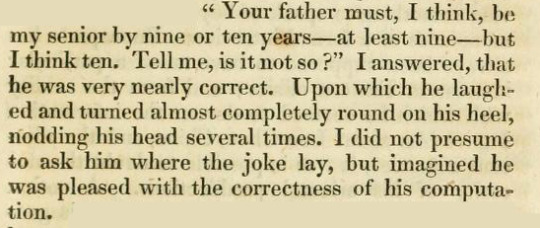
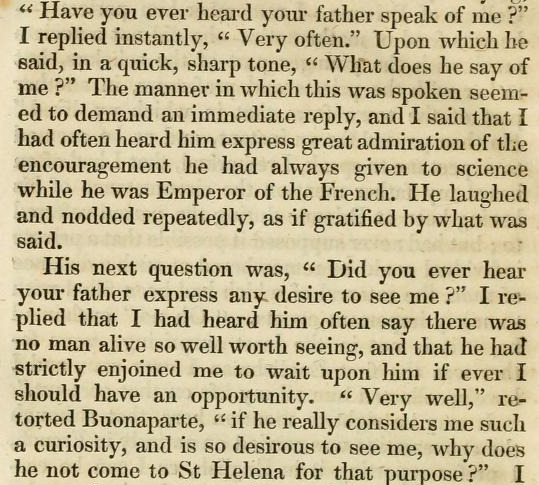
Thank goodness people wrote about their interviews with Napoleon Bonaparte. He is hilarious.
— Voyage to Loo-choo ... by Basil Hall (1826)
8 notes
·
View notes
Photo
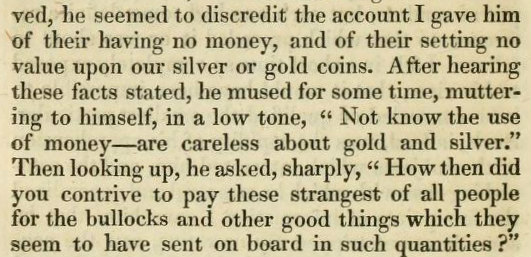
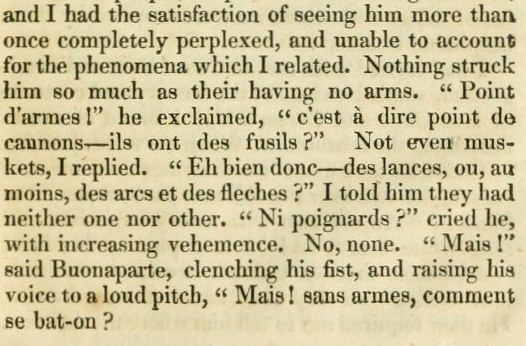
— Voyage to Loo-choo ... by Basil Hall (1826)
5 notes
·
View notes
Photo
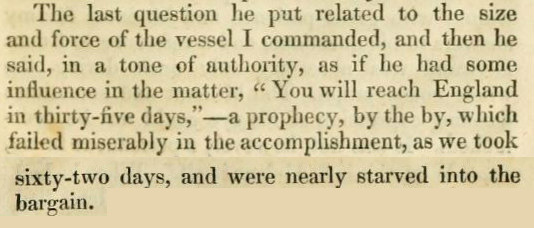
Basil Hall is also quite funny.
— Voyage to Loo-choo ... by Basil Hall (1826)
4 notes
·
View notes